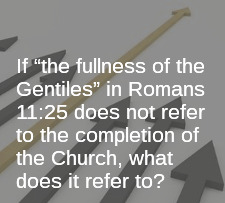Westcott & Hort Versus the Textus Receptus: Which is Superior? (Part 2)
Reprinted with permission from As I See It, which is available free by writing to the editor at [email protected]. Read Part 1.
Discussion
Westcott & Hort Versus the Textus Receptus: Which is Superior? (Part 1)
Reprinted with permission from As I See It, which is available free by writing to the editor at [email protected].
Note: This study was first composed in 1996 and published that year by Interdisciplinary Biblical Research Institute as research report no. 45, a thirteen-page booklet (ISBN 0-944788-45-9). It was an attempt to clarify issues in the “Bible texts and translations controversy” by carefully defining and explaining terms which are often bandied about by those who seem to have limited understanding as to their actual meaning. It has not previously appeared in As I See It and is presented here with minor alterations. It is supplied with extensive notes, which should be read.
The New Testament was inspired by God, and came from the pens of its writers or their amanuenses in infallible form, free from any defect of any sort, including scribal mistakes. However, it is evident from the facts of history that God in His providence did not choose to protect that infallible original text from alterations and corruptions in the copying and printing process. Scribes, and later printers, made both accidental (usually) and deliberate (occasionally) changes in the Greek text as they copied and propagated it. As a result, the surviving manuscript copies (as well as printed editions) of the New Testament differ among themselves in numerous though usually trivial details.
Discussion
Hebrews 9:23-28 tells us that Jesus entered the throne room in heaven with his own blood. When was this?
In Hebrews 9:23-28, the author is discussing how the Yom Kippur sacrifice prefigured the work of Jesus, who entered not the earthly temple with his blood — but the heavenly one, to which the earthly temple corresponds. The picture is of Jesus presenting his blood as an atoning sacrifice to the Father for all mankind for all time.
When did this take place? Here is the text itself:
Discussion
Trying to Get the Rapture Right (Part 8)
The Church in the Seventieth Week?
Of the several options on the timing of the rapture only the pretribulational view keeps the Body of Christ entirely out of the Seventieth Week of Daniel 9. But that fact says little if in fact the Church is said in Scripture to go through some or all of it. To my mind, it is no good trying to place the Body of Christ in the Seventieth Week unless there are solid reasons for doing so and appropriate excuses for diminishing the very Jewish emphasis in passages which do concern this period.
We have seen that God had in mind “Your [i.e. Daniel’s] people” in the prophecy. It also focused in on “your holy city”—Jerusalem. It is within this same period that the Olivet Discourse is situated. And there, as we have seen, Jesus is talking to Jews about Israel. We get the same story when we look at Daniel 12 or Jeremiah 30. In the Revelation the Church is not mentioned after chapter 3 and the stress is mainly upon all things Israel (7:3-8; 9:4; 11:1-2, 7-8; 11:19; 12:1, 13-14; 14:1-4; 15:3; 16:16), which is just what one would expect from reading earlier texts.
Discussion
Was Peter an Apostate?
Body
Robert Gundry believes that “Matthew’s gospel depicts Peter, after his denials — not as a forgiven apostle — but as an apostatizing false prophet.” A NT Professor with The Master’s Seminary responds.
Discussion
Trying to Get the Rapture Right (Part 7)

So far I have tried to establish these important factors in determining the timing of the rapture of the Church. I fully realize that each of these points could be studied in more depth, but for my purposes I think the coverage is satisfactory. The factors are these:
- The time of the rapture is exegetically indeterminable.
- Hence, if it is to be known it must be deduced.
- As such the timing of this event can only be arrived at by way of inference to the best explanation (i.e. the best rapture scenarios will be C3).
- The 70th Week of Daniel is seven years long and commences with “the prince who is to come” making a covenant with Israel. This period is divided in half by the breaking of the covenant. The 70th Week has Israel in mind, not the Church.
- The white horse rider who appears at the beginning of what I take to be the seven year period is the Antichrist. In light of the Day of the Lord in 2 Thessalonians 2 not coming until “the apostasy” and the revealing of the man of lawlessness/sin (2:3), the rapture seems to take place at the start of the seventieth week (although 2 Thess. 2:4 could be interpreted in a mid-trib fashion).
- The concept of the Day of the Lord and its attendant images (e.g. “birth pangs”) are not technical terms which can be restricted to one event. However, the Battle of Armageddon is strongly connected with it.
- In the Book of Revelation the Day of the Lord is associated with the Second Advent of Christ in wrath.



Discussion